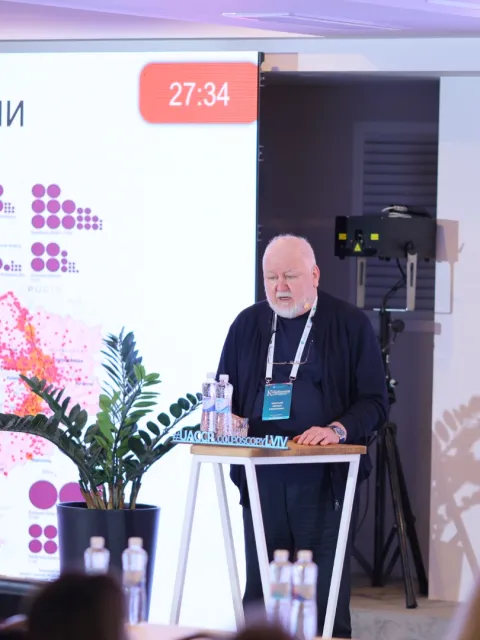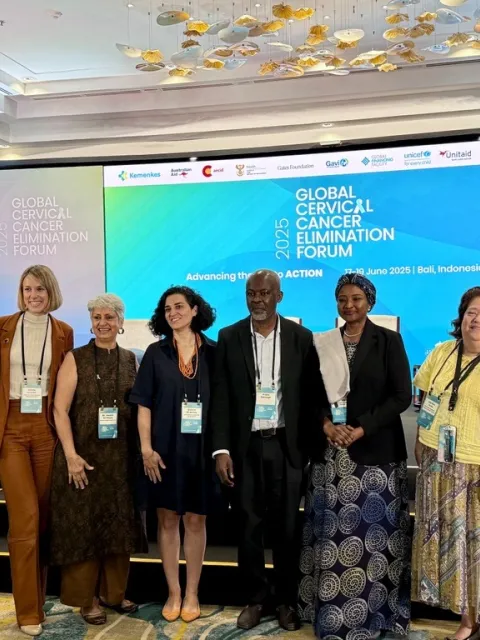Accelerating cervical cancer elimination in Burkina Faso
Burkina Faso has taken huge strides in adhering to its commitment to eliminating cervical cancer, including as part of the Unitaid-funded SUCCESS project focusing on secondary prevention.

Burkina Faso is one of four countries that are part of the Unitaid-funded ‘Scale-up Cervical Cancer Elimination with Secondary prevention Strategy’ (SUCCESS) project, led by Expertise France and delivered in collaboration with Jhpiego and UICC. Secondary prevention refers to screening for and treating precancerous lesions, enabling the early detection of possible cancers and therefore more effective treatment.
The other focus countries in the SUCCESS project are Côte d'Ivoire (Ivory Coast), the Philippines and Guatemala. Throughout the month of November, UICC will be showcasing each country’s achievements in the past year to strengthen services for cervical cancer.
The SUCCESS project is designed to assist countries in scaling-up action towards the targets outlined in WHO’s Global Strategy to eliminate cervical cancer as a public health problem, adopted by the global health community last year and launched on 17 November 2021.
These targets for 2030 include vaccinating 90% of girls by the age of 15 against the human papillomavirus (HPV), which contributes to over 70% of all cervical cancer cases; screening 70% of women by age 35 and again by age 45 using a high-performance test; and providing treatment to at least 90% of those diagnosed with cervical cancer.
Closing the gap in cervical cancer screening
On 4 February 2021, Charlemagne Ouedraogo, the Minister of Health of Burkina Faso, announced his country’s commitment to the targets outlined in the Global Strategy. On 17 June 2021, in the context of Jhpiego’s work with SUCCESS, the first woman was screened in Burkina Faso using HPV-based screening, a high-performance test recommended by WHO that is less invasive and more effective than primary visual inspection with acetic acid (VIA) generally used in Sub-Saharan Africa.
Since then and as at 30 September, 2,091 women have benefitted from this primary HPV-based testing through the SUCCESS project. To support scale-up in these facilities, with an overall target of 40,000 to be screened, over 600 clinical providers, laboratory technicians, community actors and pharmacy staff have been trained at 21 health facilities in two regions (Centre and Hauts Bassin, including Ouagadougou and Bobo Dioulasso).
The project is also strengthening laboratory capacity for HPV testing and implementing it in settings where testing for HIV, tuberculosis and COVID-19 is already being carried out.
Women who test positive for HPV are contacted and return to the health facility for VIA and, where needed, receive either thermal ablation (TA) or cryotherapy for the treatment of precancerous lesions, depending on what is available at that facility.
There are already some TA devices available in the country and through the SUCCESS project 48 more will be made available at project-supported Ministry of Health sites where health services and HIV services offer treatment for precancerous lesions.
In addition to thermal ablation, the project is also increasing the capacity for loop electrosurgical excision procedures (LEEP) at three referral locations in Burkina Faso to further support the early treatment of more developed precancerous lesions.
In addition, to ensure that women in communities are aware of the screening services available, the SUCCESS project is also working with the Ministry of Health to support their communications planning and activities for the distribution of information and educational materials. Finally, SUCCESS and the Ministry of Health will be launching an m-Health solution to support patient tracking and health system management as part of an already existing DHIS2 system that manages health information electronically.
The work of civil society – the Burkinabe Coalition Against Cancer
UICC member organisation COBUCAN (Coalition Burkinabè Contre le Cancer or the Burkinabe Coalition Against Cancer), a coalition of civil society organisations, leverages the strength of its members to speak with one voice and increase the reach and impact of civil society organisations in the country. Its aim is to fight stigmatisation and promote the right for everyone to access cancer services.
COBUCAN was established in 2020 under the auspices of H.E. Siki Kaboré, First Lady of Burkina Faso and President of the KIMI Foundation. Led by its President, Prof. Nayi Zongo, the coalition has made progress in its outreach on cervical cancer over the past year, successfully mapping and engaging civil society on this topic, and providing expanded information on cervical cancer to communities. It has mobilised women on the importance of secondary prevention of cervical cancer and raised awareness about HPV vaccination, in particular on HPV Day (9 March) 2021 with specific activities at the École nationale de santé publique (National School of Public Health).
“A first step towards eliminating cervical cancer is strengthening the cohesion and cooperation between its members and agreeing on clear, efficient goals. Together, we aim to sensitise women to the importance of preventative screening, ensure that the Ministry of Health fulfils its promise to start an HPV vaccine campaign, and advocate for increased funding to achieve an incidence rate of 4 cases of cervical cancer per 100,000 women in Burkina Faso.”
– Prof. Nayi Zongo, President of COBUCAN
COBUCAN is also participating in a UICC online course focused on the development of national advocacy efforts for the elimination of cervical cancer and is a member of the taskforce on cervical cancer elimination formed by the Ministry of Health. COBUCAN’s participation in the taskforce will serve to ensure that the views of civil societies and communities are reflected at the highest levels and that specific needs are taken into account in the national strategies.
To mark the first year since the launch of the Global Strategy on 17 November, COBUCAN will be decorating United Nations Square (the main city square) in teal, the colour designating cervical cancer, and will be conducting outreach to increase its the reach and membership of the coalition and thereby strengthen its efforts. The organisation will also be inviting the media to a roundtable on elimination and addressing an open letter to the President of Burkina Faso outlining and emphasising the importance of primary and secondary prevention.
UICC is organising a Virtual Dialogue on the role of partnerships for the elimination of cervical cancer in Francophone Africa on 17 November. This Virtual Dialogue is part of UICC’s series of Virtual Dialogues on cervical cancer elimination launched in 2020.
Last update
Thursday 11 November 2021
